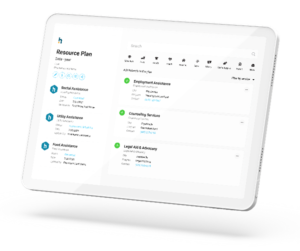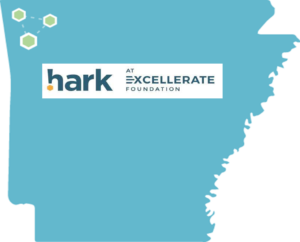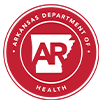Little Rock, Arkansas – August 2022 Many examples of how Social Determinants of Health (SDOH) data is used to reduce costs and improve care can be seen throughout many communities in the United States. Now, Hark is integrated with Arkansas’ health information exchange (HIE), known as the State Health Alliance for Records Exchange (SHARE).
Hark connects Northwest Arkansas residents with vital community resources and services in those moments “when life happens”. Hark’s custom client resource plans bridge the complex nature of health and human services and are based on Northwest Arkansas’ most robust database of resources. The SDOH is now available in SHARE HIE to providers throughout Northwest Arkansas and the State who care for these individual patients.
“The health of Arkansans is primarily influenced by non-medical factors such as food, housing, social connectedness, and safety, often referred to as social determinants of health, said Josh Hall, LCSW and Vice President, Excellerate Foundation / Executive Director, Hark. “To support whole-person care and make it easier for Arkansans to access the comprehensive services they need, it is necessary to connect healthcare systems and systems of SDOH services more seamlessly. This is why connecting to the statewide ‘SHARE’ HIE is valuable and sustainable.”
The goal is to connect with as many providers as possible to provide information about resources, while, at the same time, speaking to specific clients that may not be reaching out for help. Hark gathers data and insights to benefit Northwest Arkansas, and then these are aggregated to show what resources are available, accessed, missing, and so on. Hark believes that data should benefit everyone, so, with the clients’ consent, that information is shared with SHARE HIE and made available to their healthcare providers. In this way, the clients benefit even more through a statewide approach.
 Hark uses an innovative model to connect people to resources through a combination of its Hark technology platform and its connection specialists, known as Community Liaisons. To better understand the lives and health of the people of Northwest Arkansas and to help guide them to community services, Hark and SHARE worked together to build an interface linking the SDOH data to the HIE that makes the information available to providers when serving their patients’ healthcare needs.
Hark uses an innovative model to connect people to resources through a combination of its Hark technology platform and its connection specialists, known as Community Liaisons. To better understand the lives and health of the people of Northwest Arkansas and to help guide them to community services, Hark and SHARE worked together to build an interface linking the SDOH data to the HIE that makes the information available to providers when serving their patients’ healthcare needs.
The results of addressing SDOH run the gamut from reductions in healthcare costs and inpatient stays to improvements in the quality of life of residents, which are affected by things like housing stability and level of preventative care. But to truly create sustainable and impactful SDOH programs, it’s critical to look at the needs of the populations and communities serve while sharing the data to everyone in the healthcare chain of command.
The ability of SDOH initiatives to improve the overall health of members has become a primary focus in the industry. It will be the realized savings from reduced medical expenses over each covered individual’s lifetime and happier, healthier Arkansans that will provide a significant competitive advantage for SDOH early adopters.
SDOH can have a direct impact on both individuals and populations, affecting medication adherence (due to limited access or ability to pay), nutritional needs, and overall healthcare outcomes. It is important to note that SDOH plays a key role in health equity, which is defined as “creating a fair and just opportunity to be as healthy as possible and removing obstacles to health stemming from socio-demographic factors like poverty and discrimination.” This intersects with SDOH since removing obstacles to advancing health equity includes increasing access to education, housing, safe environments, and healthcare.
“Everyone in Northwest Arkansas deserves the opportunity to thrive. As Northwest Arkansas grows, so does its prosperity. But for many in our community that prosperity remains out of reach. More than 150,000 people in Benton, Madison, and Washington County face financial insecurity, housing instability, and a host of other challenges every single day. The people we serve need tangible, lasting change in the systems that shape their lives, and they need someone to fight for that change right now. Connecting our Hark data to SHARE HIE will continue our mission of providing a proactive approach towards the bigger picture and long-term impact on our communities.”
Jeff Webster, President/CEO of Excellerate Foundation
About Hark at Excellerate Foundation
In 2015, Excellerate Foundation was approached by area school superintendents to discuss solutions that would assist with students who were not coming to school ready to learn due to physical health, mental health, and basic needs. To learn more about the issue, Excellerate funded a research project called “Join the Solution”,  which consisted of approximately 3,000 surveys and 350 focus groups for a wide range of community members. The study attempted to identify why Northwest Arkansas students were not thriving and what solutions needed to be implemented as a result. The findings of the study revealed that the region is “resource rich and connection poor”, meaning that while there are often health and human services available to help, accessing them is much harder than it should be. The study also showed that this wasn’t just a problem with K-12 students but also with everyone in the region.
which consisted of approximately 3,000 surveys and 350 focus groups for a wide range of community members. The study attempted to identify why Northwest Arkansas students were not thriving and what solutions needed to be implemented as a result. The findings of the study revealed that the region is “resource rich and connection poor”, meaning that while there are often health and human services available to help, accessing them is much harder than it should be. The study also showed that this wasn’t just a problem with K-12 students but also with everyone in the region.
Excellerate launched Hark in 2017, and, since then, Hark has worked with thousands of individuals to identify needs and build connections to resources through building custom resource plans, developing innovative technology, leveraging data, and creating community collaborations. While initially conceived as the incubation of a new organization, it became apparent that Hark was a key “listening device” for Excellerate, providing a detailed picture of the needs at the individual level. Now known as Hark at Excellerate Foundation, Hark’s access to first-hand communication “from the street” and robust data sets, combined with its ability to recognize patterns in both, continues to be central to Excellerate’s efforts to identify and address the greatest systemic needs of Northwest Arkansas.
Learn more about Hark at Excellerate Foundation: harknwa.com


